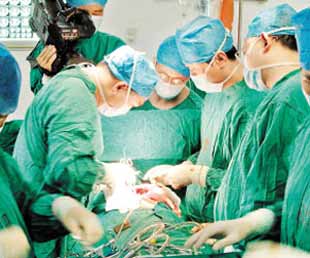| Home / Health / Health-Photo | Tools: Save | Print | E-mail | Most Read |
| 'Transplant Tour' to Developing Countries on Rise |
| Adjust font size: |
As the human organs supplies are less than the demands, transplant tour to the developing countries is on the rise, where organs can be bought, the World Health Organization (WHO) said.
The United Nations agency said Friday it is concerned about a rise in cases where people in the developing countries were persuaded to sell their body parts to outsiders, mostly through a broker. The practice has increased over the past decade, said Luc Noel of the agency's health technology and pharmaceuticals unit. "We believe 5 to 10 percent of all kidneys transplanted were in 2005 transplanted in this setting," he told a news conference in Geneva, home to the WHO's headquarters. The WHO held a meeting of experts from around the world last week to discuss how to reduce organ buying and encouraged countries to use the organs of the deceased rather than letting wealthier citizens buy them in developing countries. In Pakistan, 40 percent to 50 percent of the residents of some villages have only one kidney because they have sold the other for a transplant into a wealthy person, probably from another country, said Dr. Farhat Moazam of Pakistan, one of the participants in the meeting. Moazam said Pakistani donors are offered US$2,500 for a kidney but receive only about half of that because middlemen take so much. In Western countries, package deals are advertised on the Internet ranging from US$12,000 to US$20,000 to receive a kidney and seven days of hospitalization in a transplant country, Moazam said. "It would be far more expensive to have it done in North America," she said. Luc Noel added that of the total number of kidneys transplanted in 2005, about 6,000 involved either the donor or the recipient traveling, usually to avoid legal problems in their countries. "Live donations are not without risk, whether the organ is paid for or not," Noel said, "The donor must receive proper medical follow-up but this is often lacking when he or she is seen as a means to making a profit. Donations from deceased persons eliminate the problem of donor safety and can help reduce organ trafficking." (Xinhua News Agency April 2, 2007) |
| Tools: Save | Print | E-mail | Most Read |
 |
| Related Stories |
|
